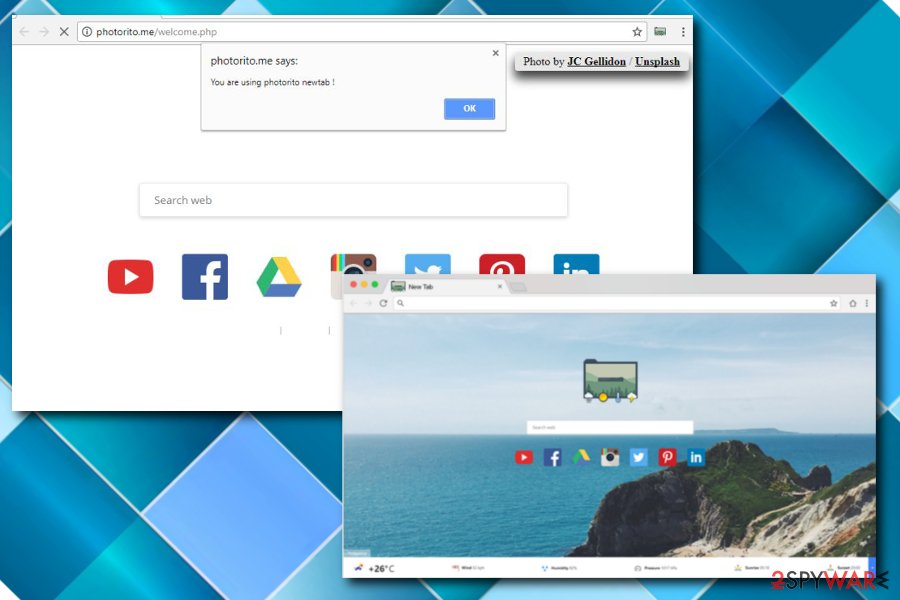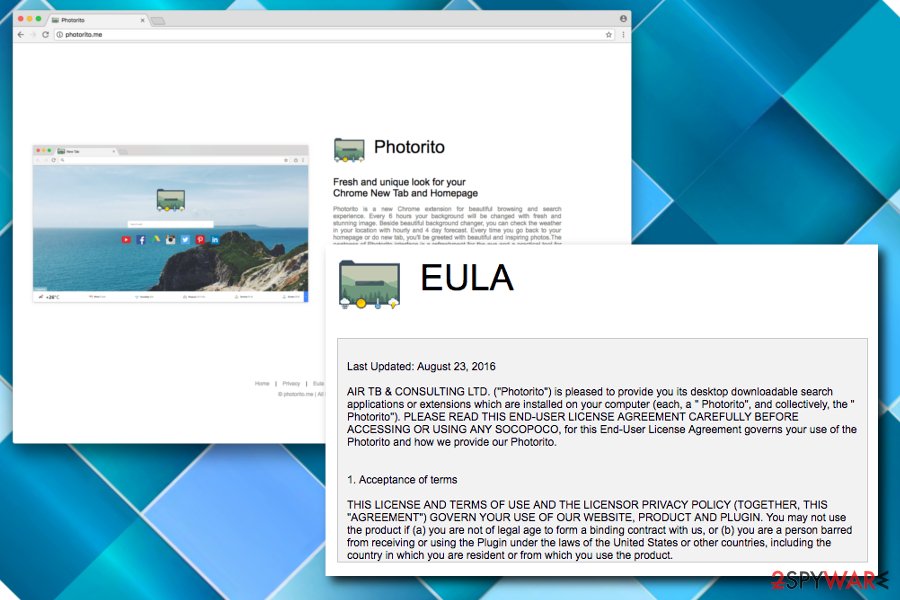Photorito.me (Virus Removal Guide) - May 2018 update
Photorito.me Removal Guide
What is Photorito.me?
Photorito is a browser-hijacking application that seeks to collect anonymous information about users

Photorito is a dubious application that promises an enhanced browsing experience. There are various sources where the browser-based application is promoted as a useful and valuable addition to your everyday browsing experience. Nevertheless, it typically enters users' machines without their consent and makes unwanted modifications to the browser's settings. Namely because of such behavior, it falls into a potentially unwanted program category. Although developers of this fraudulent search engine have been promising to enhance users' browsing experience, we believe that changing the background every 6 hours is used just to draw users' attention from more controversial activities.
| Summary | |
| Name | Photorito |
|---|---|
| Type | Browser hijacker |
| Danger level | Low. However, might lead to malware infections or data leak if not being careful |
| Distribution | Software bundling, official website, and web store, random sites and platforms with free downloads |
| Symptoms | Altered browser settings, intrusive advertisements, additional components installed, etc. |
| Elimination | You can uninstall the problem from the machine with the help of the guide below or by checking your system with the AV tool |
| Repair | System can be damaged, so running FortectIntego can help fix common issues |
Photorito virus can be installed manually from Chrome Web Store or an official website. However, as evident, users typically let this dubious app in as an additional component in a software bundle.[1] In this case, the program hijacks the system and gets a chance to initiate needed activities.
Once the suspicious program is let into the system, this intruder does the following actions:
- Replaces the page the user sees after opening a new tab/window;
- Identifies user's physical location;
- Reads and changes all data on the visited website;
- Alters search settings to hxxp://photorito.me/.
These actions can force you to use the services of the site and other platforms daily. Even though it might not bother you, note that Search displays biased search results by infusing annoying ads from affiliate pages. As a result, it increases the revenue from the traffic it brings to the sponsored websites.
Additionally, it can collect various information which might personally identify you. For example, if you submit your name, surname, or email address to the search bar, the service provider has full access to it. Sadly, but this data is not protected and can be sold to third parties or used to deliver ads that would attract you to click on them more.

Therefore, we encourage you to remove Photorito.me and never use its services again. Instead, choose a more reliable search engine like Google, Bing, or Yahoo and be sure that your computer's security and privacy is not at risk. You can follow the manual elimination guidelines at the end of this article.
If you still feel that this fake search engine is worth your trust, be aware that the delivered ads might hold a script which can trigger a malware installation. Therefore, if you support a suspicious search engine and click on the advertisements, you might get infected with various potentially unwanted programs or dangerous viruses, including spyware, trojan horses or key loggers.
Thus, Photorito.me removal is the best decision if you care about your security. SpyHunter 5Combo Cleaner or Malwarebytes can help you since the anti-malware tool is one of the most convenient options when trying to get rid of the intruder. We recommend it since it takes only a few minutes to complete the termination procedure.

Prevent unwanted programs by installing freeware correctly
If you are questioning yourself, how the nasty browser hijacker infiltrated your machine, you should look at programs you recently installed. It is because PUP creators add their apps as optional components inside other program's installers. To cleverly hide the application and trick the user to install it, software developers urge victims to pick Recommended or Quick installation mode, which automatically installs optional programs.
Therefore, you should always install software only using Custom or Advanced options and de-select all permissions to install the potentially unwanted program. Additionally, avoid clicking on sponsored ads since, as mentioned above, they might be malware-laden and infiltrate other possible threats on your computer[2].
Finally, employ robust security software that can protect you from dangers that unwanted applications bring you.

Photorito should be removed from your machine immediately
If you choose the automatic malware removal option, it will only take a few minutes to complete. Also, note that this is the safest option since browser hijackers might hold extra components which you are not aware of. Therefore, do not try to get rid of the potentially unwanted program by yourself.
Instead, either pick a security software or follow manual elimination instructions to remove Photorito.me from your computer. They will show you how to uninstall additional add-ons which support this browser program. However, experts from LosVirus.es[3] strongly advise you to make sure that you don't skip steps not to harm your PC.
You may remove virus damage with a help of FortectIntego. SpyHunter 5Combo Cleaner and Malwarebytes are recommended to detect potentially unwanted programs and viruses with all their files and registry entries that are related to them.
Getting rid of Photorito.me. Follow these steps
Uninstall from Windows
Instructions for Windows 10/8 machines:
- Enter Control Panel into Windows search box and hit Enter or click on the search result.
- Under Programs, select Uninstall a program.

- From the list, find the entry of the suspicious program.
- Right-click on the application and select Uninstall.
- If User Account Control shows up, click Yes.
- Wait till uninstallation process is complete and click OK.

If you are Windows 7/XP user, proceed with the following instructions:
- Click on Windows Start > Control Panel located on the right pane (if you are Windows XP user, click on Add/Remove Programs).
- In Control Panel, select Programs > Uninstall a program.

- Pick the unwanted application by clicking on it once.
- At the top, click Uninstall/Change.
- In the confirmation prompt, pick Yes.
- Click OK once the removal process is finished.
Delete from macOS
Remove items from Applications folder:
- From the menu bar, select Go > Applications.
- In the Applications folder, look for all related entries.
- Click on the app and drag it to Trash (or right-click and pick Move to Trash)

To fully remove an unwanted app, you need to access Application Support, LaunchAgents, and LaunchDaemons folders and delete relevant files:
- Select Go > Go to Folder.
- Enter /Library/Application Support and click Go or press Enter.
- In the Application Support folder, look for any dubious entries and then delete them.
- Now enter /Library/LaunchAgents and /Library/LaunchDaemons folders the same way and terminate all the related .plist files.

Remove from Microsoft Edge
Delete unwanted extensions from MS Edge:
- Select Menu (three horizontal dots at the top-right of the browser window) and pick Extensions.
- From the list, pick the extension and click on the Gear icon.
- Click on Uninstall at the bottom.

Clear cookies and other browser data:
- Click on the Menu (three horizontal dots at the top-right of the browser window) and select Privacy & security.
- Under Clear browsing data, pick Choose what to clear.
- Select everything (apart from passwords, although you might want to include Media licenses as well, if applicable) and click on Clear.

Restore new tab and homepage settings:
- Click the menu icon and choose Settings.
- Then find On startup section.
- Click Disable if you found any suspicious domain.
Reset MS Edge if the above steps did not work:
- Press on Ctrl + Shift + Esc to open Task Manager.
- Click on More details arrow at the bottom of the window.
- Select Details tab.
- Now scroll down and locate every entry with Microsoft Edge name in it. Right-click on each of them and select End Task to stop MS Edge from running.

If this solution failed to help you, you need to use an advanced Edge reset method. Note that you need to backup your data before proceeding.
- Find the following folder on your computer: C:\\Users\\%username%\\AppData\\Local\\Packages\\Microsoft.MicrosoftEdge_8wekyb3d8bbwe.
- Press Ctrl + A on your keyboard to select all folders.
- Right-click on them and pick Delete

- Now right-click on the Start button and pick Windows PowerShell (Admin).
- When the new window opens, copy and paste the following command, and then press Enter:
Get-AppXPackage -AllUsers -Name Microsoft.MicrosoftEdge | Foreach {Add-AppxPackage -DisableDevelopmentMode -Register “$($_.InstallLocation)\\AppXManifest.xml” -Verbose

Instructions for Chromium-based Edge
Delete extensions from MS Edge (Chromium):
- Open Edge and click select Settings > Extensions.
- Delete unwanted extensions by clicking Remove.

Clear cache and site data:
- Click on Menu and go to Settings.
- Select Privacy, search and services.
- Under Clear browsing data, pick Choose what to clear.
- Under Time range, pick All time.
- Select Clear now.

Reset Chromium-based MS Edge:
- Click on Menu and select Settings.
- On the left side, pick Reset settings.
- Select Restore settings to their default values.
- Confirm with Reset.

Remove from Mozilla Firefox (FF)
Remove dangerous extensions:
- Open Mozilla Firefox browser and click on the Menu (three horizontal lines at the top-right of the window).
- Select Add-ons.
- In here, select unwanted plugin and click Remove.

Reset the homepage:
- Click three horizontal lines at the top right corner to open the menu.
- Choose Options.
- Under Home options, enter your preferred site that will open every time you newly open the Mozilla Firefox.
Clear cookies and site data:
- Click Menu and pick Settings.
- Go to Privacy & Security section.
- Scroll down to locate Cookies and Site Data.
- Click on Clear Data…
- Select Cookies and Site Data, as well as Cached Web Content and press Clear.

Reset Mozilla Firefox
If clearing the browser as explained above did not help, reset Mozilla Firefox:
- Open Mozilla Firefox browser and click the Menu.
- Go to Help and then choose Troubleshooting Information.

- Under Give Firefox a tune up section, click on Refresh Firefox…
- Once the pop-up shows up, confirm the action by pressing on Refresh Firefox.

Remove from Google Chrome
Delete malicious extensions from Google Chrome:
- Open Google Chrome, click on the Menu (three vertical dots at the top-right corner) and select More tools > Extensions.
- In the newly opened window, you will see all the installed extensions. Uninstall all the suspicious plugins that might be related to the unwanted program by clicking Remove.

Clear cache and web data from Chrome:
- Click on Menu and pick Settings.
- Under Privacy and security, select Clear browsing data.
- Select Browsing history, Cookies and other site data, as well as Cached images and files.
- Click Clear data.

Change your homepage:
- Click menu and choose Settings.
- Look for a suspicious site in the On startup section.
- Click on Open a specific or set of pages and click on three dots to find the Remove option.
Reset Google Chrome:
If the previous methods did not help you, reset Google Chrome to eliminate all the unwanted components:
- Click on Menu and select Settings.
- In the Settings, scroll down and click Advanced.
- Scroll down and locate Reset and clean up section.
- Now click Restore settings to their original defaults.
- Confirm with Reset settings.

Delete from Safari
Remove unwanted extensions from Safari:
- Click Safari > Preferences…
- In the new window, pick Extensions.
- Select the unwanted extension and select Uninstall.

Clear cookies and other website data from Safari:
- Click Safari > Clear History…
- From the drop-down menu under Clear, pick all history.
- Confirm with Clear History.

Reset Safari if the above-mentioned steps did not help you:
- Click Safari > Preferences…
- Go to Advanced tab.
- Tick the Show Develop menu in menu bar.
- From the menu bar, click Develop, and then select Empty Caches.

After uninstalling this potentially unwanted program (PUP) and fixing each of your web browsers, we recommend you to scan your PC system with a reputable anti-spyware. This will help you to get rid of Photorito.me registry traces and will also identify related parasites or possible malware infections on your computer. For that you can use our top-rated malware remover: FortectIntego, SpyHunter 5Combo Cleaner or Malwarebytes.
How to prevent from getting browser hijacker
Choose a proper web browser and improve your safety with a VPN tool
Online spying has got momentum in recent years and people are getting more and more interested in how to protect their privacy online. One of the basic means to add a layer of security – choose the most private and secure web browser. Although web browsers can't grant full privacy protection and security, some of them are much better at sandboxing, HTTPS upgrading, active content blocking, tracking blocking, phishing protection, and similar privacy-oriented features. However, if you want true anonymity, we suggest you employ a powerful Private Internet Access VPN – it can encrypt all the traffic that comes and goes out of your computer, preventing tracking completely.
Lost your files? Use data recovery software
While some files located on any computer are replaceable or useless, others can be extremely valuable. Family photos, work documents, school projects – these are types of files that we don't want to lose. Unfortunately, there are many ways how unexpected data loss can occur: power cuts, Blue Screen of Death errors, hardware failures, crypto-malware attack, or even accidental deletion.
To ensure that all the files remain intact, you should prepare regular data backups. You can choose cloud-based or physical copies you could restore from later in case of a disaster. If your backups were lost as well or you never bothered to prepare any, Data Recovery Pro can be your only hope to retrieve your invaluable files.
- ^ Product Bundling. Wikipedia. The Free Encyclopedia.
- ^ Juliana de Groot. What Is Malvertising?. Digital Guardian. Enterprise IP & DLP Software.
- ^ LosVirus. LosVirus. Security and Spyware News.























